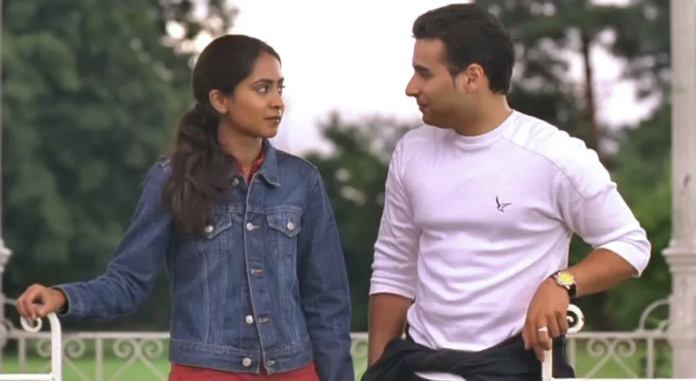On its 22nd anniversary, the film’s explicit intersectional queerness and implicit sapphism stands as a celebration of its underrepresented communities
By INDRANIL BASU — arts@theaggie.org
“Bend It Like Beckham” is a 2002 sports comedy-drama film directed by Gurinder Chadha and written by Chadha, Paul Mayeda Berges and Guljit Bindra. The film follows the story of Jess Bhamra (Parminder Nagra), who is the daughter of Sikh Punjabi immigrants in Hounslow, London. She has just graduated high school and is preparing for her elder sister’s wedding in the summer before university. Jules Paxton (Keira Knightly), a member of a local women’s amateur football team called the Hounslow Harriers, notices her skills at a local park and invites her to try out for the team.
The film’s central characters as well as the main plot are not explicitly queer, but “Bend It Like Beckham” is iconic as a queer film because of its heavily sapphic-coded relationship between Jess and Jules. Despite this, the film does explicitly deal with queerness in two subplots with positive representation.
Jess’ close friend, Tony (Ameet Chana), who is also South Asian, comes out to her about halfway through the film. Subtly but surely, when Jess and him are discussing their liking for David Beckham, the film’s namesake, Tony says, “No, Jess. I really like Beckham,” emphasizing the “really.” After a moment of connecting the dots in her mind, understanding the difference in their ways of liking him between her idolizing the star athlete as opposed to Tony’s sexual attraction toward him, Jess’ response is, “But you’re Indian!”
This highlights the dichotomy of identities that are expected of diasporic Indians when it comes to queerness. To have an intersection in these identities, thanks to Western imposition of homophobia, is unfathomable. Therefore, having this Indian-British character portrayed as queer in 2002 was groundbreaking, especially for the rarely represented South Asian queer communities. It is quite fascinating to see how this representation didn’t pan out in more films — the film’s acknowledgment of this struggle, even in a subplot, was greatly significant.
The other subplot is Jules’ white British mother overhearing a conversation between Jess and Jules, thinking that they were involved romantically and that Jess broke Jules’ heart. She is extremely concerned that Jules is lesbian and is triggered every time Jules is hugging or “friendly-kissing” Jess, which creates situational comedy in the film. Ultimately, her queerphobia takes over, and her fears culminate in the dramatic confrontation between her and Jess in front of the entire wedding audience during her sister’s “vidai” to her in-laws.
In front of all of them, she calls Jess a hypocrite and demands to know “how [she] could be respectful here with [her] lot” when she knows (or rather thinks) that Jess has been “kissing [her] daughter in broad daylight?” In what becomes the climactic comedic punchline of the scene, she says, “Get your lesbian feet out of my shoes!”
Pulling her mother away from further embarrassment, Jules clarifies that she isn’t a lesbian but that she and Jess were “fighting because [they] both fancied [their] coach.” She adds, “Anyways, being a lesbian is not that big of a deal.”
The two young women protagonists, despite their different backgrounds, signify with their “allyship” that their progressive views are that of the filmmaker. The film was originally supposed to have a sapphic love story between them, but due to fear of a negative reaction from the film’s Indian audience (as seen in other Indian sapphic films before then), the coach, Joe (Jonathan Rhys Meyers) was introduced as a beard (someone used by a queer person/people to have a queer relationship while presenting as heteronormative to the outside world), according to various rumors. Other than their trauma bonding, and the fact that he believed in her athletic ability when no one else would, there is no real chemistry between Jess and Joe, or even Jules — whereas we can see the chemistry between the two girls, especially through Jules’ mother’s eyes when she perceives them to be sapphic for each other.
There are many clear indications of Jess and Jules’ sapphism throughout the film: there is lots of “gay gazing” as Jules observes Jess playing football in the park; the two girls have a queer butch or tomboyish aesthetic, including bandanas, rejection of push-up bras and sportswear and we see the contrast when Jess is made to dress up for an event, or with Jules’ hyper-feminine mother.
The film is about women’s football, with shots inside the locker room of women changing with each other and in community. All of the shots of the players warming up and playing in their Adidas “trackies” have been the gay awakening for countless women who today recount the queer legacy of the film.
It is also strewn with various sapphic references, like mention of the queer tennis player Martina Navratilova, gay icon Melanie C aka Sporty Spice and usage of their music and the iconic Bollywood courtship song “Noorie” sung by a woman. Also, the fact that the film was directed by a woman brings a feminine gaze that adds to the sapphism of the film.
Recently, Knightly mentioned that she would love to see an actual lesbian sequel to the film, to which Chada has responded positively.
Although the film follows Jess and Jules going against their families (especially their mothers) to pursue football and then careers in professional football, to those who know the sapphic contexts and connotations of the film, or even without, the film is truly about the coming-of-age of these two women who defy gender, sexuality and cultural norms to make a place for themselves in the soccer world.
You can find “Bend It Like Beckham” on Hulu and Disney+.
Written by: Indranil Basu — arts@theaggie.org









